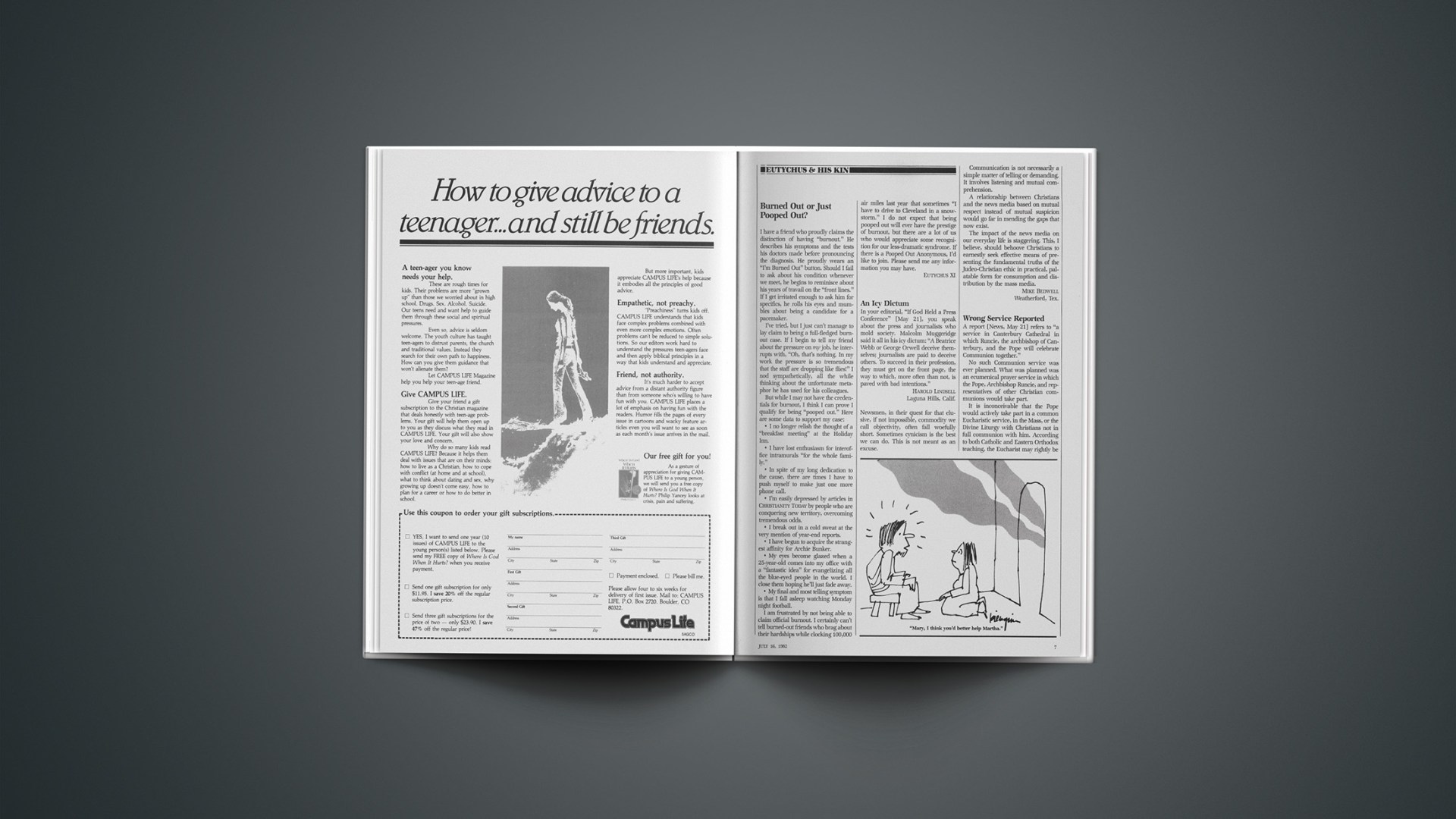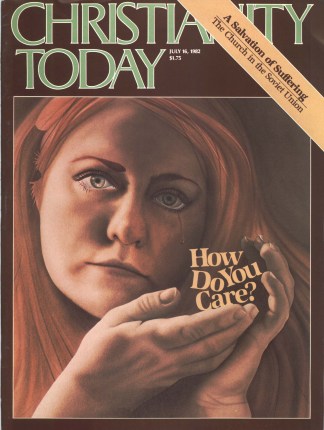Burned Out or Just Pooped Out?
I have a friend who proudly claims the distinction of having “burnout.” He describes his symptoms and the tests his doctors made before pronouncing the diagnosis. He proudly wears an “I’m Burned Out” button. Should I fail to ask about his condition whenever we meet, he begins to reminisce about his years of travail on the “front lines.” If I get irritated enough to ask him for specifics, he rolls his eyes and mumbles about being a candidate for a pacemaker.
I’ve tried, but I just can’t manage to lay claim to being a full-fledged burnout case. If I begin to tell my friend about the pressure on my job, he interrupts with, “Oh, that’s nothing. In my work the pressure is so tremendous that the staff are dropping like flies!” I nod sympathetically, all the while thinking about the unfortunate metaphor he has used for his colleagues.
But while I may not have the credentials for burnout, I think I can prove I qualify for being “pooped out.” Here are some data to support my case:
• I no longer relish the thought of a “breakfast meeting” at the Holiday Inn.
• I have lost enthusiasm for interoffice intramurals “for the whole family.”
• In spite of my long dedication to the cause, there are times I have to push myself to make just one more phone call.
• I’m easily depressed by articles in CHRISTIANITY TODAY by people who are conquering new territory, overcoming tremendous odds.
• I break out in a cold sweat at the very mention of year-end reports.
• I have begun to acquire the strangest affinity for Archie Bunker.
• My eyes become glazed when a 25-year-old comes into my office with a “fantastic idea” for evangelizing all the blue-eyed people in the world. I close them hoping he’ll just fade away.
• My final and most telling symptom is that I fall asleep watching Monday night football.
I am frustrated by not being able to claim official burnout. I certainly can’t tell burned-out friends who brag about their hardships while clocking 100,000 air miles last year that sometimes “I have to drive to Cleveland in a snowstorm.” I do not expect that being pooped out will ever have the prestige of burnout, but there are a lot of us who would appreciate some recognition for our less-dramatic syndrome. If there is a Pooped Out Anonymous, I’d like to join. Please send me any information you may have.
EUTYCHUS XI
An Icy Dictum
In your editorial, “If God Held a Press Conference” [May 21], you speak about the press and journalists who mold society. Malcolm Muggeridge said it all in his icy dictum: “A Beatrice Webb or George Orwell deceive themselves; journalists are paid to deceive others. To succeed in their profession, they must get on the front page, the way to which, more often than not, is paved with bad intentions.”
HAROLD LINDSELL
Laguna Hills, Calif.
Newsmen, in their quest for that elusive, if not impossible, commodity we call objectivity, often fall woefully short. Sometimes cynicism is the best we can do. This is not meant as an excuse.
Communication is not necessarily a simple matter of telling or demanding. It involves listening and mutual comprehension.
A relationship between Christians and the news media based on mutual respect instead of mutual suspicion would go far in mending the gaps that now exist.
The impact of the news media on our everyday life is staggering. This, I believe, should behoove Christians to earnestly seek effective means of presenting the fundamental truths of the Judeo-Christian ethic in practical, palatable form for consumption and distribution by the mass media.
MIKE BEDWELL
Weatherford, Tex.
Wrong Service Reported
A report [News, May 21] refers to “a service in Canterbury Cathedral in which Runcie, the archbishop of Canterbury, and the Pope will celebrate Communion together.”
No such Communion service was ever planned. What was planned was an ecumenical prayer service in which the Pope, Archbishop Runcie, and representatives of other Christian communions would take part.
It is inconceivable that the Pope would actively take part in a common Eucharistic service, in the Mass, or the Divine Liturgy with Christians not in full communion with him. According to both Catholic and Eastern Orthodox teaching, the Eucharist may rightly be celebrated and received in a common service only by those who are first in full ecclesial communion with one another.
REV. MSGR. DANIEL S. HAMILTON
The Long Island Catholic
Hempstead, N.Y.
The Church Before the Divorce
I enjoyed “Notice the Divorced Among Us” [May 21], but I wondered whether, when we give this kind of help to the divorced, we are saying: It is okay to divorce; we will help you through it. I cannot help but wonder where the church was before the divorce happened. That is the time when others should take a couple into their prayer life and really pray for them sincerely.
BEVERLY ARMSTRONG
Watertown, Minn.
I agree that the church must minister to the needs of people who have divorced. But the church cannot support openly choosing sin, which is what a couple in the process of divorcing are doing.
JAN FULKS
Northbrook, Ill.
“Spatial” Ascension
It seems incredible that a serious theologian, who is a believer in Scripture, should deny the “spatial” aspect of the ascension of Jesus Christ. “Jesus Did Not Leave—He Reigns Through Us” [May 21].
If the ascension is not viewed as a spatial event with Jesus going from one place into another, then its significance is lost.
To believe in the geographical fact of the ascension is not to doubt for a moment the present life and ministry of Christ through his church. It was in his physical body, his humanity, that the Lord lived, died, revived, and ascended here. It is in his spiritual body, the church, that the Lord in his deity continues his work here.
ROBERT F. RAMEY
Emmaus Bible School
Oak Park, Ill.
Personal Bias?
While I do appreciate his comments regarding scriptural lyrics, Richard Dinwiddie made his personal bias evident in “Can Gospel Music Be Saved?” [May 21].
His answer for any contemporary sacred music woe seems to lie in the hymnal; we need not bow in homage to our hymnals. His only example of a contemporary Christian music setting is a 1966 hymn tune. So much has happened these last 16 years. I love our hymnal, but in our church, tastes run from “Jesu, Priceleśs Treasure” to funky Christian jazz. We seek to use both and everything in-between to the glory of the Master. By being “all things to all men,” in a musical sense, we will win a spiritual victory in the hearts of our congregants as God’s truth is expressed in many kinds of music.
REV. JON T. KARN
Warren Baptist Church
Warren, Oreg.
There is so much mediocrity in “Christian” music these days that it’s really refreshing to have a standard for excellence raised. Richard Dinwiddie has given us a glimpse of the historical significance of music in the church and many practical and positive suggestions on how to shore up the erosion of Christian musical values.
CHRISTINE ECKHARDT
Farmers Branch, Tex.
Mid-life Crisis Unnecessary
Being a young pastor, I appreciated Warren Wiersbe’s “Mid-life Crisis? Bah, Humbug!” [May 21]. It not only sets down the keys to a lifelong positive ministry (in an enjoyable way), but models them as well. Maybe the reason so many pastors have a “mid-life crisis” is that they are not willing to laugh at themselves. Now I don’t have to spend the next ten years preparing for my identity crisis.
REV. DAVID H. JOHNSON
Faribault Evangelical Free Church
Faribault, Minn.
Correction
The review of Christian-Marxist Dialogue in Eastern Europe [CRT, May 21] was appreciated, but we would like you to publish a correction of its author’s name—Paul Mojzes (not Majzes).
NANCY KRODY
Journal of Ecumenical Studies
Temple University
Philadelphia, Pa.
Letters are welcome. Only a selection can be published. Since all are subject to condensation, those of 100 to 150 words are preferred. Address letters to Eutychus and His Kin, CHRISTIANITY TODAY, 465 Gundersen Drive, Carol Stream, Illinois 60187.






